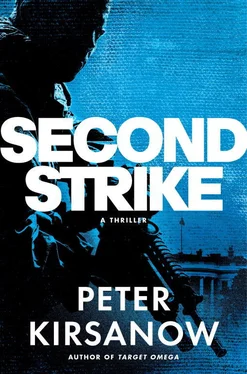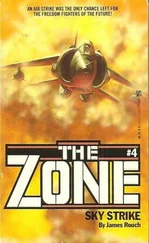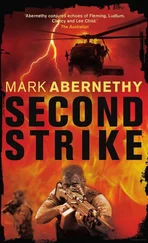Morosov looked about the room. At least half a dozen uniformed security personnel were stationed about the perimeter. He suspected there were others who had been embedded in the unit since its inception. In fact, as he surveyed the surroundings the old SVR agent was able to spot them without much difficulty. A few were observing him with furtive sidelong glances while ostensibly working on their desktop computers.
A tall, striking woman with short flame-red hair and a crestfallen expression walked briskly toward Morosov and extended her hand. “Elena Kolovskya. I apologize for being so forward. We met when Colonel Egorshin was in university. He and I were classmates. Honestly, no one was in his class. We were all simply admirers. Major Volkov was his second, officially. But I had the privilege of being Piotr’s principal technical assistant. We worked closely. My condolences.”
“Thank you, that means much to me,” Morosov said genuinely. “I have no children, and as you may know, Piotr’s father died when Piotr was young, so he was like a son to me.”
Gramov and Kolovskya nodded sympathetically. Gramov said to Kolovskya, “Mr. Morosov’s here to collect any personal effects.”
“Security protocols were implemented as soon as the news became known,” Kolovskya said. “They inspected Piotr’s entire workspace and I presume they took everything of note with them. But you are welcome to look over his workspace and take whatever remains. Security, of course, will want to inspect whatever you take with you before you leave.”
“Please show me the way,” Morosov said.
Kolovskya led Morosov to a ten-by-ten glass-enclosed workspace at the front of the room facing the giant screen. The room contained only a plexiglass desk, a simple desktop computer, a phone, and a chair. The arrangement appeared no more complex or impressive than that of an average telemarketer. But it was the command and control for the entire operation, an almost incomprehensible amount of computing power. The computer screen displayed a whimsical screensaver. No doubt security had checked it.
Kolovskya and Gramov left Morosov alone. He scanned the area for any personal effects. A photo of Tatiana in a small wooden frame next to the computer screen was all that remained on Piotr’s desk. She was smiling, the Eiffel Tower in the background.
Morosov leaned forward to inspect the photo. As he did so he placed his right hand flat on the desk on one side of the computer and his left hand on the other. He picked up the photo to gaze at it for a moment, then returned it to the desk, placing it on the left side of the computer. While continuing to gaze at the photo, he tapped his right index finger on the desk. The subtlest of misdirections. With a practically imperceptible movement of his left hand he inserted Piotr’s device into a port in the side of the computer, obscured by the photo frame. The magician.
Morosov straightened, looked about, and left the space. Gramov and Kolovskya met him immediately.
“I suspect security took everything?” Kolovskya asked.
“Almost. They left a photo of Tatiana. Nothing else.”
“Once security sifts through everything, they will release anything that does not relate to work. I can contact you if anything remains,” Kolovskya offered.
“That is kind of you. Thank you,” Morosov said as he conducted a mental countdown. “I suppose I will be on my way and leave you to your work.”
Morosov shook their hands and walked to the exit. Halfway there he paused, looked at his watch a moment, then turned and walked back. Gramov and Kolovskya met him just outside Piotr’s workspace.
“On reflection,” Morosov said, “I suppose I should take the photo. Tatiana would want it, I believe. Do you mind?”
Gramov and Kolovskya moved aside deferentially. “Of course not,” Kolovskya said, waving him in. “Please.”
Morosov entered the workspace and once again leaned against the desktop, briefly assuming the same pose he’d held before. Another magic trick and Piotr’s device was in his left palm. Morosov removed the photograph from the desk, nodded thanks toward Gramov and Kolovskya, and proceeded toward the elevators.
Several minutes later Piotr Egorshin’s favorite uncle, his only uncle, was walking toward his car. His stride was long, almost triumphant, not that of a man on the verge of retirement.
Upon reaching his car he turned to look at the building where his nephew had worked. That building, and the cavernous spaces beneath, held more destructive power than had been unleashed by the entire Red Army during World War II. Although it was the tyrant Stetchkin’s domain, it was Piotr, the gentlest of souls, who had made its power possible.
And Piotr, through his uncle Sergei the magician, would have his revenge.
WHITE HOUSE SITUATION ROOM,
AUGUST 18, 7:05 A.M. EDT
Several members of the National Security Council were waiting in the Situation Room for President Marshall. They had been summoned by White House Chief of Staff Iris Cho, who, contrary to standard practice, provided no reason for the meeting.
The assembled group consisted of Secretary of Defense Douglas Merritt, CIA Deputy Director John Kessler, Secretary of State Ted Lawrence, Secretary of Homeland Security Susan Cruz, Director of National Intelligence Joseph Antonetti, and Chairman of the Joint Chiefs Robert Taylor.
Their wait was brief. The door opened and President Marshall entered, followed by Iris Cho and James Brandt, who was led to his customary seat between Merritt and Cruz by Arlo. Marshall remained standing behind his chair, a practice he’d adopted since the EMP affair, partly out of superstition.
“Thank you for getting here on time with such short notice. I’m told the others are traveling and are unavailable for videoconference. I don’t have a specific agenda. That’s not my normal practice, I know, but this is not a normal meeting.
“What we learned from the EMP affair gave us all, I suspect, a PhD in vigilance and threat assessment. We also learned to pay attention to Mike Garin.”
There was a faint rustle in the room. The mention of the name had the effect of an injection of caffeine.
“Jim and I spoke with Garin a short time ago. He believes the Russian agent Taras Bor is here to ‘paralyze’ us, whatever that means. But, apparently, the specific word ‘paralyze’ was used by a Bor associate to describe what Bor was planning to do.”
Marshall paused to let everyone absorb what he said. He continued.
“The paralysis is to be preceded by a decoy attack consisting of suicide bombers. We have no further information about any of this, other than Bor is personally responsible for some sort of backup attack should the main attack fail.
“Now, before we go any further, keep in mind that for the time being nothing discussed here is to go beyond this room. Not even your deputies can know about this. Whoever was providing assistance to the Russians during the EMP affair is still operating. Since all of you were involved in stopping the EMP attack, I can entrust this information to you. But for now, only you. Unless, during the course of this meeting, we determine otherwise.
“There’s another component to all of this. The Russians are engaged in military maneuvers along their western border—all the way from the Baltics southward. I received some inconclusive information about this in the PDB, but nothing to suggest the troop movements were anything out of the ordinary.”
Kessler spoke up. “Mr. President, we’ve seen Russian troop presence along the borders of the Baltic states, but nothing beyond what’s noted in the PDB. We haven’t heard or seen anything that might confirm Garin’s concerns.”
Читать дальше












